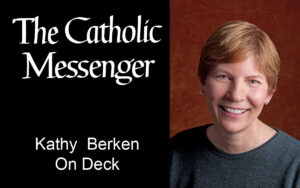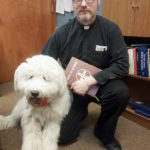By Kathy Berken
Oh, those “Joyful Christians!” Sometimes don’t you just want to scream? Who really wants to imitate those ancient saints with the painted smiles and halos, forever looking upwards towards a mysterious beam of light?
 Nope, not me. If that’s what it means to be a “Joyful Christian,” then let me be miserable. After all, the world is a chaotic and often terrifying place. Joy just seems hypocritical, right?
Nope, not me. If that’s what it means to be a “Joyful Christian,” then let me be miserable. After all, the world is a chaotic and often terrifying place. Joy just seems hypocritical, right?
Yet, as life would have it, the retreat team I work with at the Franciscan Retreat Center in Prior Lake, Minn., decided our 2018 theme would be “Towards a Spirituality of Joy: Love More, Laugh More, Be Not Afraid.” My conference topic emanates from Jesuit Father James Martin’s 2011 book, “Between Heaven and Mirth.” He always appears to be a fun-loving, happy, joyful priest who says that humor around religion is a good thing because we have taken ourselves way too seriously for way too long. However, don’t be sacrilegious, he warns, because there is a place for everything, but when singing the “Alleluia,” for example, please inform your face. If we celebrate the Mass, then celebrate. Our Sunday greeters need to welcome people with a genuine smile. When we praise God in the “Gloria,” then let our whole beings mean what we say.
Yet we protest. Look, we say, I’m not a perky kind of person. Yes, I know. You can’t just plaster a smile on your face. We first need to be authentic and simply ourselves. If you don’t feel like smiling or laughing, then don’t pretend. Besides, humor and laughter sometimes don’t arise from joy. Comedians are the first to say that their humor often comes from a tragic life, and laughter may simply be a knee-jerk response to an incongruity.
Joy is very different.
Last year I met poet Christian Wiman, who has a rare, painful bone marrow cancer. Yet he finds his faith and poetry healing, as beautifully depicted in his new anthology, “Joy: 100 Poems,” where I discovered a wonderful definition of joy by the poet Rainer Maria Rilke. “Joy is a marvelous increasing of what already exists, a pure addition out of nothingness. . . . Joy is a moment, unobligated, timeless from the beginning, not to be held but also not to be truly lost again.”
Wiman agrees that joy cannot be grasped or conjured. Instead, joy is “that something in the soul that makes one able to claim again the word ‘soul.’ That sensation more exalting than happiness, less graspable than hope.” Joy is not to be possessed but experienced, sensed. It is that “seed of being which can bud even in our ‘circumstance of ice,’” so there is no way to plan for it or attempt to create it, but instead, we can “try to make oneself fit to feel the moment when it comes, and let it carry you where it will.”
Remember, being joyful isn’t the same as being cheerful. Joy bestows beauty, peace and humility and is at the heart of a strong, healthy, spiritual life. I experienced true joy at the birth last month of my newest granddaughter, Isabelle Marie, named after my long-deceased mother.
When your joy is from deep inside, people will see it in your eyes. Perhaps the idea is that joy is a seed waiting to be cultivated. Joy may appear almost out of nowhere, so it’s critical to pay close attention to its arrival. This God-created joy can blast you right out of your present situation, so hold onto those moments for dear life. These are the experiences to embrace, to cherish, and to treasure when all may seem lost.
(Kathy Berken has a master’s degree in theology from St. Catherine University, St. Paul, Minn. She lived and worked at The Arche, L’Arche in Clinton 1999-2009 and is author of “Walking on a Rolling Deck: Life on the Ark (stories from The Arch).”)










